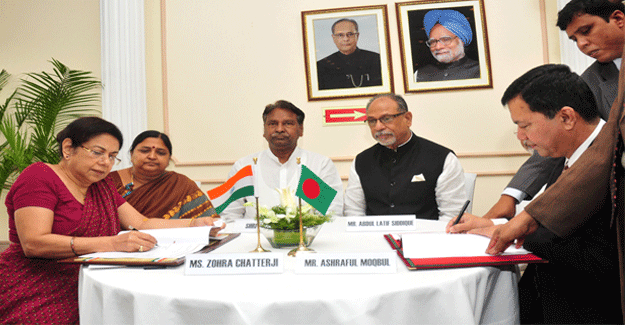
India, Bangladesh sign MoU on Textile Sector Collaboration
Cotton Purchase Agreement in the pipeline
India and Bangladesh have signed a MoU on Textiles Sector Collaboration to further enhance cooperation in the textile sector, and are studying the final drafts of a Cotton Purchase Agreement. This follows a meeting on August 19, 2013, between the Union Minister of Textiles, India, Dr K S Rao, and the Textile and Jute Minister of Bangladesh Abdul Latif Siddique.
The MoU was signed by Zohra Chatterjee, Secretary, Textiles, Government of India and Md. Ashraful Moqbul,Senior Secretary, Textiles and Jute, Government of Bangladesh. In a statement, Dr Rao said, “Our talks have been constructive, cordial and fruitful. The issues covered included enhancement of collaboration in textiles sector between the two countries by signing an MoU on textiles sector collaboration, cotton security for Bangladesh textiles mills and the establishment of a successor organization for the International Jute Study Group in Dhaka through Joint efforts at the UNCTAD.”
The MoU on Textiles Sector Collaboration will entail the setting up of a joint working group, with the objective of establishing alliances between the textile institutions of the two countries, in skill building, fashion and research. “In 2013-14 cotton season I have assured his Excellency that Bangladesh textiles mills will not have any difficulties in sourcing cotton from India,” said the Indian minister.
Another point of discussion was the setting up of a successor organization to the International Jute Study Group (IJSG), as its term ends in March 2014. “India has in-principle agreed to support the Bangladesh initiative for a successor multilateral organization in jute sector for taking forward the initiatives of the IJSG. We would also be willing to form a joint front with the Government of Bangladesh in requesting prospective member countries to support a proposal for forming a new organization as a successor to IJSG at UNCTAD, as and when the conference is convened on request of the initiating countries. The basic requirement to move a request to UNCTAD is that it should be moved by countries representing major share in the production and trade of the commodity (i.e. jute and allied fibers). India and Bangladesh account for over 90% of the world production of jute and allied fibers. Important buyers include Turkey, China, Pakistan, among others,” informed Rao.
India and Bangladesh have been improving their textile trade relations over the years. In 2011, India allowed duty-free, quota-free access of 48 textiles lines of Bangladesh readymade garments to India, withdrew countervailing duties from all jute products from Bangladesh to India, simplified testing requirements on Jaamdani saris, reviewed marking and labeling requirements for jute bags, cotton and cotton yarn exports to Bangladesh.
India has further brought down duties on all imports from Bangladesh under the SAFTA agreement. India’s textile imports from Bangladesh in pursuance of the Prime Minister’s visit in 2011 have increased from US$ 164 million in 2010 to US$ 271 million in 2011 and US$ 289 million in 2012. In 2013, statistics indicate an increase of 15% over 2012. Imports are increasing in chapters 61, 62 and 63, that is, apparel and home textiles.
Textile Excellence
If you wish to Subscribe to Textile Excellence Print Edition, kindly fill in the below form and we shall get back to you with details.













